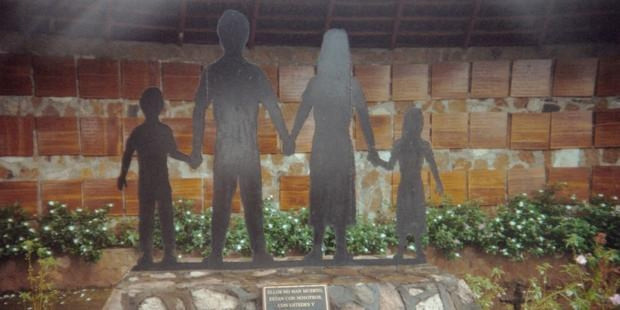30 Years After Massacre In El Salvador, Justice May Finally Come For Victims

An international human rights court has ruled that a civilian massacre committed by El Salvador’s military more than three decades ago during the country’s bloody civil war is not covered under an amnesty law and must be investigated.
The El Mozote massacre, as it is known, took place Dec. 11-13, 1981, in the village of El Mozote and among the surrounding communities located in the remote eastern region of Morazon.
The Inter-American Court of Human Rights said in its judgment that a minimum of 281 people were killed based on remains uncovered but that the number was likely more than 1,000 based on the testimonies of relatives and survivors, half of whom were children.
The massacre was carried out by the army ordered by the U.S.-backed junta government of Gen. Carlos Humberto Romero, which suspected that the local residents in and around El Mozote were sympathetic to left-wing guerillas, who began an armed revolution in 1980.
“Under a supposed counter-insurgency operation, a ‘scorched earth’ policy was planned and executed by the state,” read a summary of the judgment.
“Indeed, the facts show that the Armed Forces executed everyone in its path: the elderly, men, women and children. They killed animals, destroyed and burned crops and homes and devastated the community.”
No one has ever been prosecuted in relation to the massacre as the result of a 1992 amnesty law that was part of the resolution to the Salvadoran Civil War, which had raged on for 12 years and resulted in approximately 75,000 deaths.
Last year, the government of President Mauricio Funes, affiliated with the left-wing Farabundo Marti Liberation Front, which descended from a guerilla movement in 1980, formally acknowledged the massacre and publicly apologized on behalf of the state.
“It is positive that the Salvadoran authorities have finally recognized the state’s responsibility for this terrible event,” said Guadalupe Marengo, Amnesty International’s deputy director for the Americas Program, in a statement last year.
“However, those who survived the slaughter -- and the families of victims -- have received neither justice nor reparation. Families need to know exactly what happened to their relatives. They need those who perpetrated these horrific crimes to be held to account. And they are entitled to redress for what they themselves have suffered.”
The court has implored the Salvadoran government to investigate the killings and identify and prosecute those responsible for the massacre. It also asked the government to identify all of the victims, recover their remains if possible and provide reparations to their families and other survivors of state violence.
The Inter-American Court of Human Rights is a judicial body affiliated with the Organization of American States and is focused on protecting human rights throughout the Americas.
© Copyright IBTimes 2025. All rights reserved.





















